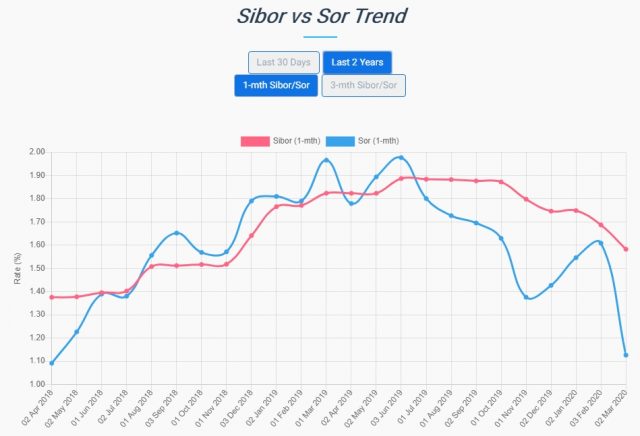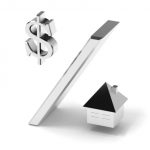With major banks revising their home loan offerings after the Sibor plunge, now may be the best time to refinance
The Singapore inter-bank offered rate (Sibor) plunged in response to the Fed’s two off-cycle rate cuts in March. The Sibor plunge has caused the major banks to revise their home loan offerings by increasing spreads in their floating rate packages while lowering their fixed rates.
Mr Paul Ho, chief mortgage officer at iCompareLoan, said, “when Sibor plunge, banks increase the spread. For example when sibor was 1.5% Sibor + 0.2% was available, and when Sibor is below 1%, banks will raise the spread – it becomes Sibor + 0.35%, etc, as it is now.”
Table of Contents

Near zero Fed interest rate cut to drive mortgage loan rates south
The Federal Reserve cut its key interest rate to near zero, a dramatic move not seen since the depths of the 2008 financial crisis.
The one-percentage-point decrease was the U.S. central bank’s second emergency rate cut this month in an attempt to cushion the rapidly growing economic effects of the coronavirus pandemic.
The Sibor plunge is the result of the near zero Fed interest rate cut. the Fed also announced plans to buy $700 billion in government securities.
“The effects of the coronavirus will weigh on economic activity in the near term and pose risks to the economic outlook,” the Fed said in a statement announcing the moves Sunday. “In light of these developments, the [Federal Open Market] Committee decided to lower the target range for the federal funds rate to 0 to 1/4 percent.”
Fed Chairman Jerome Powell, speaking with reporters on a conference call, said: “Families, businesses, schools, organizations and governments at all levels are taking steps to protect people’s health. These measures, which are essential for containing the outbreak, will nonetheless understandably take a toll on economic activity in the near term.”
The near zero Fed interest rate affects the cost of borrowing on everything from credit cards to auto loans.
The near zero Fed interest rate cut is expected to have an impact on credit cards, mortgages, vehicle loans and bank savings accounts here. This is because Singapore interest rates are closely correlated with those in the US. The SIBOR (Singapore interbank offered rate) for example is expected to go down. This could bring back some of the enthusiasm to the suppressed property market. The emergence of the Covid-19, which is likely to have a noticeable impact on global development, at least in the first quarter of this year. This disruption could spill over to the rest of the global economy.
The near zero Fed interest rate announcement comes after a series of Fed interest rates lowering, Singapore interest rates and home loans could be headed south.
Some banks began cutting their home loan interest rates as early as April last year. DBS and UOB were among the early movers offering between 2.38 per cent and 2.48 per cent in April, from around 2.58 per cent to 2.68 per cent earlier. In mid-July, rates below 2 per cent appeared with DBS offering three-year fixed-rate home loan package with a first-year rate of 1.89 per cent as a “National Day special”.
But are even lower rates possible? If the coronavirus continues spreading, then it is a definite “yes”. The worse the COVID-19 outbreak gets, the lower mortgage rates will go. If Covid-19 becomes an epidemic in the United States, then rates on home loans are likely to fall even further.
Since the third quarter of last year, banks have lowered interest rates for both fixed and floating home loan packages by 10 – 30 basis points (bps).
With the Sibor plunge, some banks have already lowered their home mortgage rate to 1.35 per cent, to keep pace with the decreasing interest rates.
The 3-month SIBOR has is 0.99 per cent now. The further lowering announced by the Fed is expected to drive the interest rates for mortgage loans further down.
Homeowners who are worried about the types of home loans with interest rates that are exceptionally volatile, might opt for good fixed rate mortgages. Fixed rate mortgages may give homeowners thousands of dollars (perhaps even a five-figure sum or more) each year. Homeowners could potentially also enjoy a two-three times difference in their total interest repayment if they opted for fixed rate mortgages.
Some homeowners may however miss out on such potential savings, even with the Sibor plunge, because they are overwhelmed by the banking process. Others might be put off by technical jargon like SIBOR, FHR, Board Rates. Such homeowners may hesitate to explore fixed rate mortgages and wish for someone to just hand them the cheapest home loan package across 16 banks.
Some reasons why homeowners may hesitate
- Unsure of the loan amounts they are eligible for and how to calculate them.
- Unsure as to when or why they should refinance.
- Unsure about how the new banking regulations is affecting them.
- Unsure of the loan tenure they should go for.
- Unsure about the amount of CPF they should use for the purchase of their homes.
And there is good reason why homeowners are unsure and unfamiliar on how to get the best deal interest rates for their home loans. Most don’t buy homes as often as you buy other necessities (like food and clothes). But actually, there is no reason why you should contribute to the banks’ profits when you can keep the difference in interest rates.
All such homeowners need to do is, look for a mortgage specialist. The mortgage specialists will give them the advice that they need at zero cost to the homeowners. In case you are wondering why the service by the mortgage broker is free to the borrower – it is because the lenders will pay the mortgage broker a distribution fee upon successful disbursement of loan.






